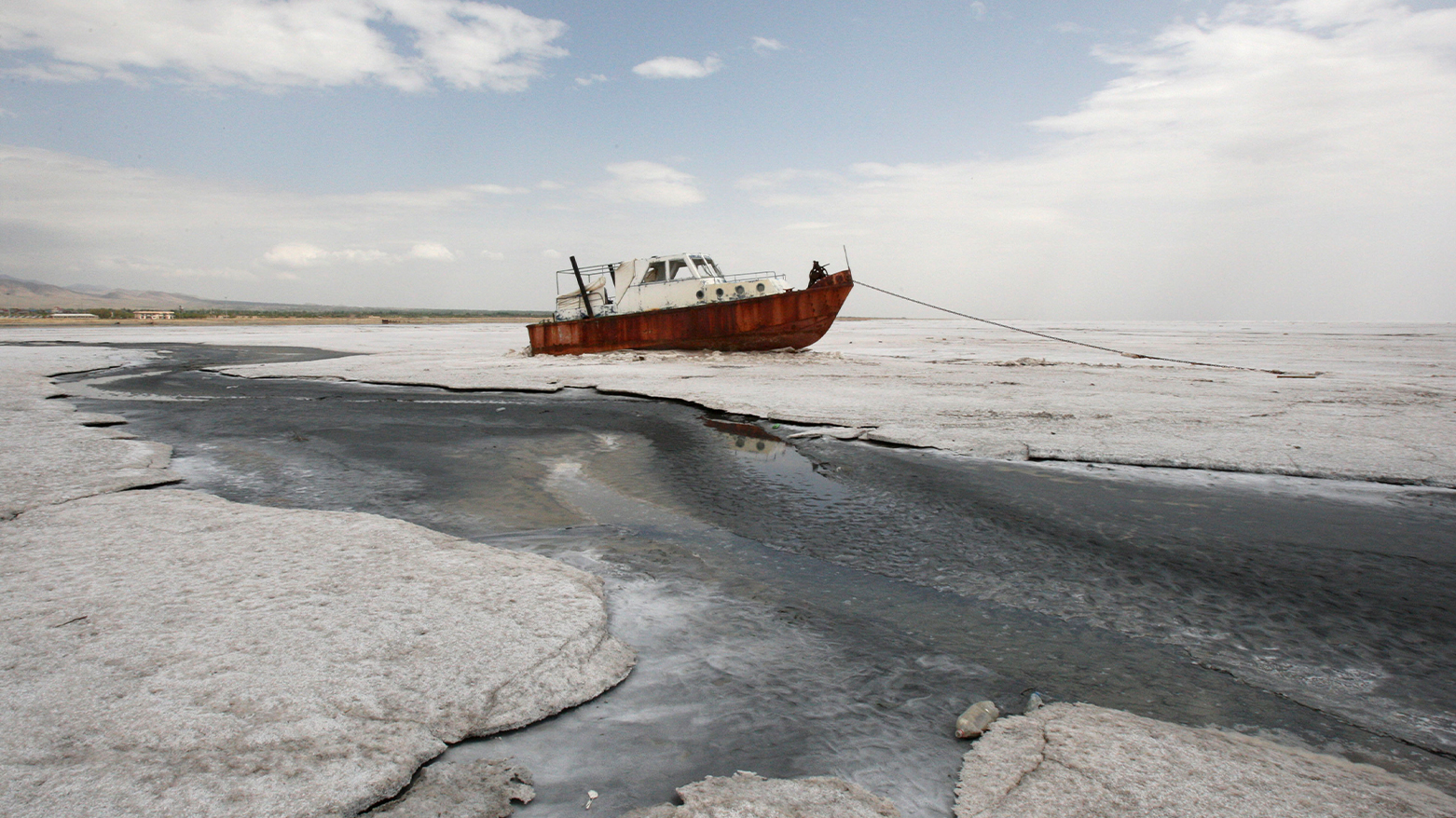'No Water Surface on the Lake': Urmia MP Warns of Catastrophe, Slams Tehran's Inaction
Urmia MP, Hakem Mamkan, warned that Lake Urmia in Eastern Kurdistan (northwest Iran) is now “99% dry” with “no water surface,” citing catastrophic social and environmental fallout. He condemned Tehran’s years of “talk therapy” and studies without real action to save the once-vast lake.

ERBIL (Kurdistan24) – In a stark and damning assessment that confirms the worst fears of environmentalists and local communities, a representative for Urmia in the Iranian Parliament has declared that Lake Urmia, once Iran's vibrant "turquoise jewel" and one of the largest saltwater lakes on Earth, has effectively ceased to exist, with "no water surface" remaining.
The parliamentarian, Hakem Mamkan, delivered a blistering critique of successive government administrations, accusing them of engaging in years of fruitless "talk therapy" and studies while failing to take the practical, executive measures necessary to avert a catastrophic environmental, social, and security crisis that now threatens to inflict "irreparable" damage on the region.
Speaking in an interview with the Iranian Labour News Agency (ILNA), Mamkan painted a grim and unequivocal picture of the lake's current state. "The reality is that, if we are to assess the situation, the condition of Lake Urmia is extremely critical," he stated. "I can say that there is currently no water surface on the lake. It can be said that ninety-nine percent of it has dried up, and only a section around the mid-lake causeway is left."
This on-the-ground assessment from a local representative gives a powerful voice to the devastating satellite imagery from NASA, which, as previously reported by Kurdistan24, recently confirmed the complete disappearance of the 4,000-year-old body of water.
Mamkan expressed the profound frustration felt by local and national representatives over the government's persistent inaction. "The reality is that we, the province's representatives, and even many representatives at the national level, firmly believe that the government must enter the implementation and operational phase of restoring Lake Urmia," he asserted. He accused both previous and current administrations of wasting vast sums of money on ineffective measures and endless discussions that have yielded no tangible results.
"Although significant funds were spent on studying and restoring Lake Urmia in previous administrations, none of these efforts have yielded results," he said. "The Lake Urmia Restoration Committee held numerous meetings in previous administrations, and the 14th administration has also held regular meetings, but we have not seen any results that would improve the lake's condition."
The parliamentarian issued a direct and urgent demand to the current government, warning that the time for studies is over and that the consequences of further delay will be severe.
"One of our demands from the president and the 14th administration is that they take practical and executive measures to restore the lake as soon as possible," Mamkan said, "because this issue will unfortunately lead to social and even security-related discontent at the regional and national levels."
He detailed the cascade of catastrophic consequences that will inevitably follow the lake's complete desiccation. The environmental fallout, he warned, will be immense.
The vast, exposed lakebed, now a saline desert, poses a severe threat to public health. The salt dust whipped up from the dry basin is predicted to cause a spike in high blood pressure, lead to an increase in skin cancer, and destroy vast swathes of agricultural land.
"Experts predict that this dust will have an impact as far as the vicinity of Zanjan and Qazvin," he noted, highlighting the far-reaching nature of the disaster.
The social and economic toll will be equally devastating, with some researchers warning that the disappearance of the lake could put between 6 and 15 million people at risk, potentially triggering a massive wave of environmental migration as agriculture collapses and living conditions become untenable.
Mamkan outlined a series of practical, multi-faceted measures that have long been proposed but never properly implemented.
He acknowledged that some "hardware measures," such as the Kani Sib water transfer project from Piranshahr, have been partially implemented, but he stressed that this is not enough.
A comprehensive solution, he argued, requires a concerted effort across multiple government ministries. "We are also requesting that crop patterns be reformed, and the Ministry of Agriculture Jihad must take action in this area," he stated. "Illegal wells must be dealt with, and the Ministry of Energy must act on this matter. Additionally, irrigation methods and techniques must be improved."
His core criticism is that while the solutions are known, the political will to implement them has been fatally absent. "There are many factors that could work together to restore Lake Urmia, but unfortunately, none of these actions have been properly carried out so far," he lamented.
"One of our criticisms of the government is that it has focused more on talk and studies ('talk therapy') and has not proceeded to the implementation phase." He dismissed the government's frequent excuse that such measures would be too costly.
"We do not accept this because this is a national, international, and regional issue, and it is necessary to use national funds to prevent these problems," he concluded.
His powerful intervention serves as a desperate, eleventh-hour plea for action to save what little may be left of a vital ecosystem that was once a cornerstone of the region's climatology, economy, and culture.
The complete disappearance of Lake Urmia in Eastern Kurdistan, a slow-motion disaster driven by a combination of excessive water extraction for agriculture, the unrestrained construction of dams, and a significant reduction in rainfall, now stands as a stark and tragic symbol of the devastating consequences of environmental mismanagement and government paralysis.